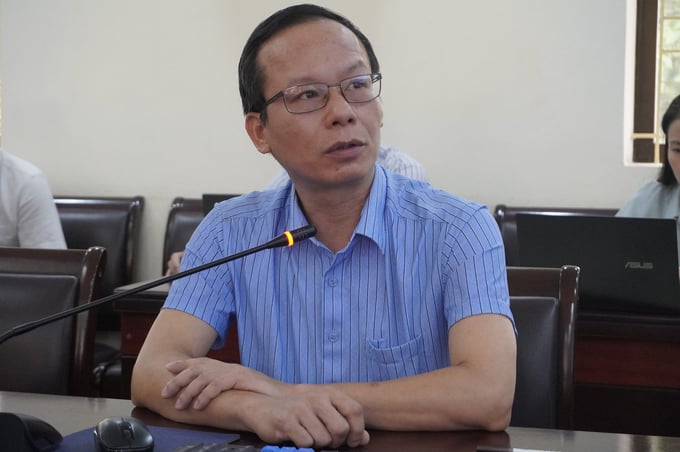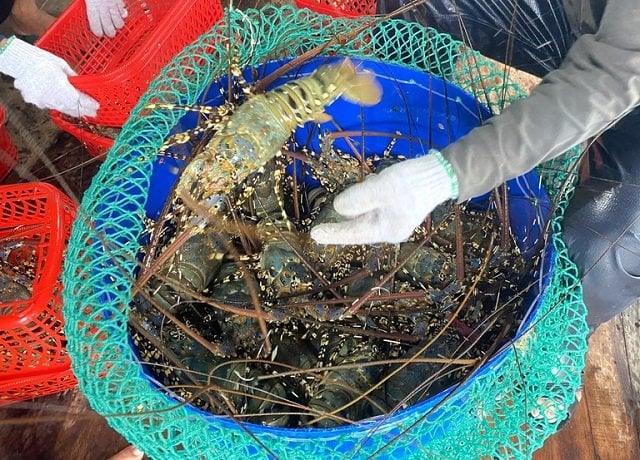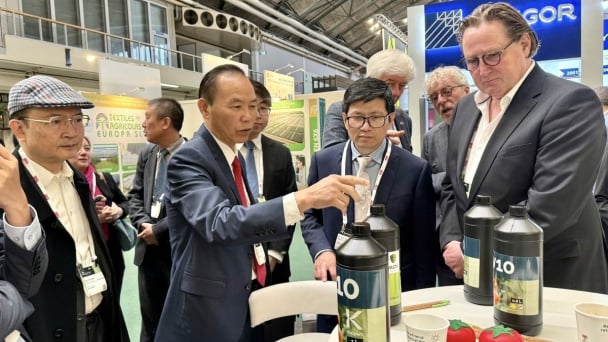June 14, 2025 | 07:26 GMT +7
June 14, 2025 | 07:26 GMT +7
Hotline: 0913.378.918
June 14, 2025 | 07:26 GMT +7
Hotline: 0913.378.918
The information regarding China's regulations was provided by Dang Van Vinh, Deputy Head of the National Authority for Agro - Forestry - Fishery Quality, Processing and Market Development (NAFIQPM, Ministry of Agriculture and Rural Development), during the first meeting of the Negotiation, Market Access, and Market Development Team under the Steering Committee for Food Safety, Quality, and Market Development. The meeting was held on the morning of May 23 in Hanoi.

Dang Van Vinh, Deputy Head of the National Authority for Agro - Forestry - Fishery Quality, Processing and Market Development, there are no aquaculture facilities in Vietnam that produce or utilize seedlings from at least F2 generation in compliance with China's regulations. Photo: Hong Tham.
According to Deputy Head Vinh, the expansion of Vietnamese fishery exports to the Chinese market is currently facing several difficulties and obstacles, including:
The processing and approval of supplementary registration documents for live seafood packaging facilities, along with the update of facility information and resolution of technical issues on the China Import Food Enterprises Registration (CIFER) system under China's General Administration of Customs, experience frequent delays.
Slow response from the Chinese authorities regarding supplementary registration documents for products permitted for export to China. Notably, Vietnam's documents regarding salted jellyfish products, dispatched since October 2022, is still awaiting evaluation feedback from the Chinese authorities. Additionally, there is a delay in addressing reports explaining flagged Vietnamese export shipments.
Deputy Head Vinh reported that China has classified ornate rock lobster under Group 2 of endangered species since February 1, 2021.
In May 2023, China amended its Law on Wildlife Protection, subsequently prohibiting the harvest of endangered animals as listed in 2021.
Accordingly, the fishing, use, and trading of natural ornate rock lobster are strictly prohibited.
The General Administration of Customs of China has instructed its customs agencies at various ports to strictly control the import of naturally harvested ornate rock lobster.
Farmed ornate rock lobster imported into China for consumption must comply with regulations stipulating that they are not directly harvested from the sea; accompanied by detailed evidence of the aquaculture process. Additionally, their seedlings must not originate from natural sources (i.e: seedlings must be acquired from the F2 generation onwards).

All farmed ornate rock lobster seedlings in Vietnam originate from natural sources. Photo: Kim So.
Businesses looking to export to China must obtain a license from the Fisheries Department under Ministry of Agriculture of China.
"Regarding the export of Vietnamese ornate rock lobster to China, all farmed ornate rock lobster seedlings in Vietnam originate from natural sources. There are no aquaculture facilities in Vietnam that produce or utilize seedlings from the F2 generation onwards in compliance with China's regulations," emphasized Mr. Vinh.
Translated by Nguyen Hai Long

(VAN) The Department of Agriculture in South Africa has announced the country’s first mass vaccination of poultry to prevent local birds from contracting avian influenza.

(VAN) Establishment of the Mekong Delta Regional Agricultural Linkage Center, aiming for a closed value chain, deep processing, trading platforms, and international market connectivity.

(VAN) Gia Lai province has recently recorded 460 rare species of animals and plants, contributing to forest conservation and biodiversity planning in the region.

(VAN) Ms. Caroline Beresford, New Zealand Ambassador to Vietnam, expressed confidence that agricultural cooperation between Vietnam and New Zealand will develop sustainably, be climate-resilient, and promote gender equality.

(VAN) Vietnam reaffirms its commitment to international cooperation in fostering sustainable and responsible fisheries while ensuring resilient livelihoods for small-scale fishing communities.

(VAN) More than just a technical solution, science and technology are gradually becoming a cornerstone in Vietnam’s journey toward building a circular economy.

(VAN) The Netherlands is ready to accompany Vietnam in building a green, circular, and sustainable agriculture sector that is resilient to climate change.